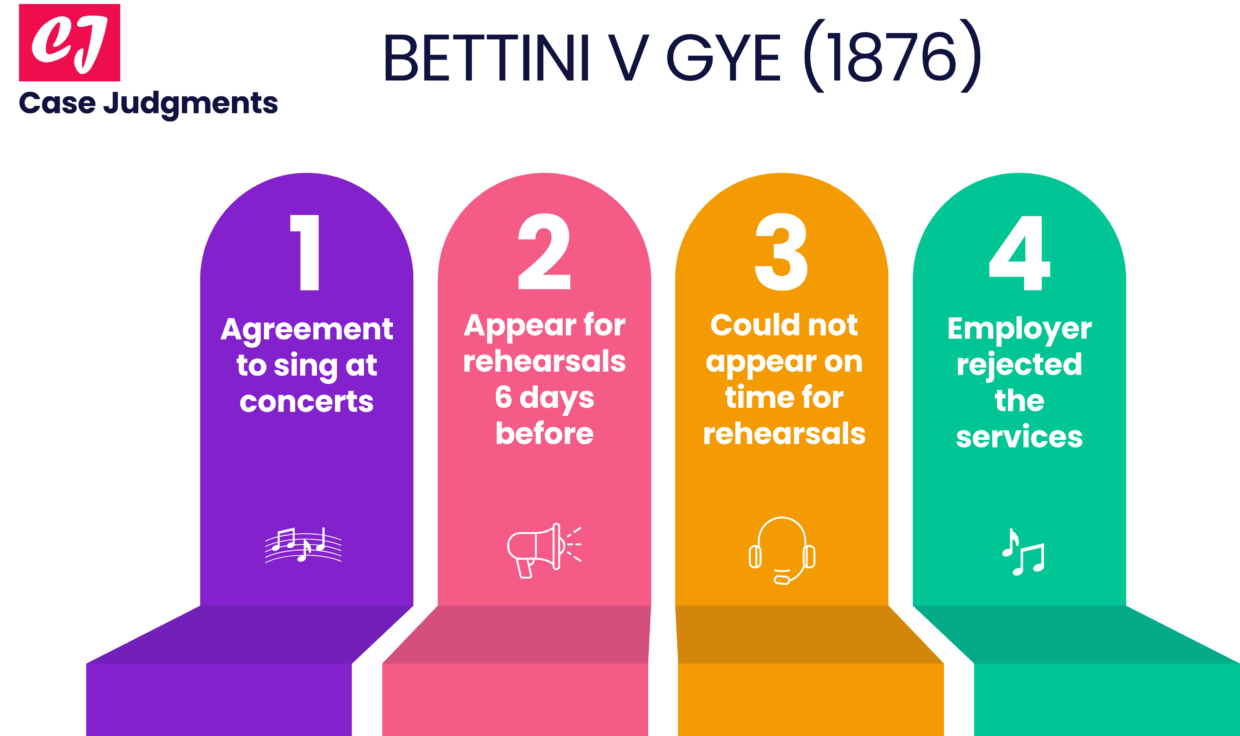
Bettini v Gye (1876): A Case Summary
Case name & citation: Bettini v Gye (1876) 1 QBD 183
- Court and jurisdiction: Queen’s Bench, England and Wales
- Year of the case: 1876
- The learned judge: Blackburn J
- Area of law: Breach of a condition; termination of the contract
What is the case about?
In the landmark case of Bettini v Gye (1876), an important distinction between a breach of a condition and a breach of a warranty in contract law was established. This case highlights the challenging task faced by courts when a term is not specifically designated by statute, requiring them to determine whether it qualifies as a condition—a breach of which would entitle the aggrieved party to terminate the contract—or as a warranty, which would merely give rise to a right to seek damages. In making this determination, the courts carefully evaluate the significance of the term within the broader context of the contract. They consider whether the term plays a vital role, directly impacting the fundamental purpose of the agreement, or if its role is comparatively minor. This assessment of the term’s importance serves as the primary factor in distinguishing between conditions and warranties, shaping the legal consequences that follow a breach thereof.
Facts of the case (Bettini v Gye)
The plaintiff, Bettini, and the defendant, Gye, had entered into a service contract pertaining to the plaintiff’s singing engagements at concerts and operas in London. The agreement specified a set of dates from 30th March 1875 to 13th July 1875. Crucially, Bettini was obliged to be present in London without fail at least six days before the commencement of his performances for rehearsal purposes. However, due to a temporary illness, Bettini was unable to arrive in London until 28th March, without providing any prior notice to Gye regarding this delay. Consequently, upon Bettini’s arrival, Gye declined to accept his services.
Issue
In the case at hand, the central question revolved around the significance of the requirement mandating the presence of the plaintiff in London “without fail” six days prior to rehearsals. It became crucial to determine if this term constituted a condition of the contract and, consequently, if Gye had the right to cancel the contract due to the breach of this term.
Judgment of the Court in Bettini v Gye
The ruling declared the refusal to be unjustified, as it was determined that Bettini had only breached a warranty rather than a condition. The court recognized that the impact of missing a few rehearsals was insignificant in the context of a 15-week season.
Blackburn J defined a condition as going “to the root of the matter so that a failure to perform it would render the performance of the rest of the contract by the plaintiff substantially different from what the defendant has stipulated for.”
To put it differently, the violation of a condition carries significant implications, that may grant the innocent party the right to be discharged from any further obligations outlined in the contract, along with a claim for damages.
Here, in this case, the delay to appear for the rehearsals was only a breach of warranty. A breach of this warranty does not indicate a repudiation of the contract, and as a result, Gye would only have an action in damages.
List of references:
- http://ndl.ethernet.edu.et/bitstream/123456789/14461/1/110.pdf
- https://repository.londonmet.ac.uk/6174/1/Barrie-Guide%20to%20Contract%202020-2021%20VOLUME%20TWO.pdf
- https://nashashibilaw.weebly.com/uploads/2/0/5/9/20597118/the_modern_law_of_contract.pdf
- https://www.lawteacher.net/cases/bettini-v-gye.php
You might also like:
More from contract law:

